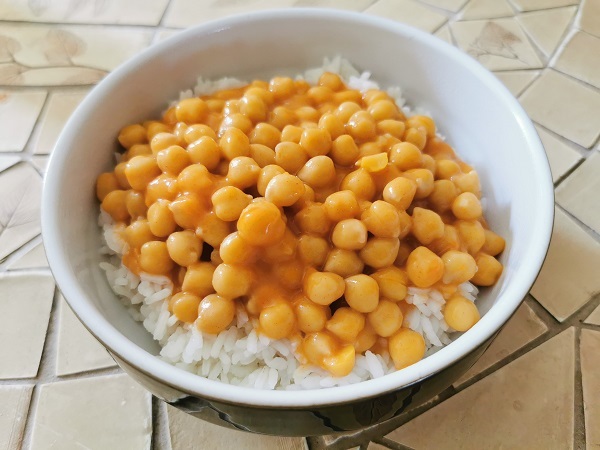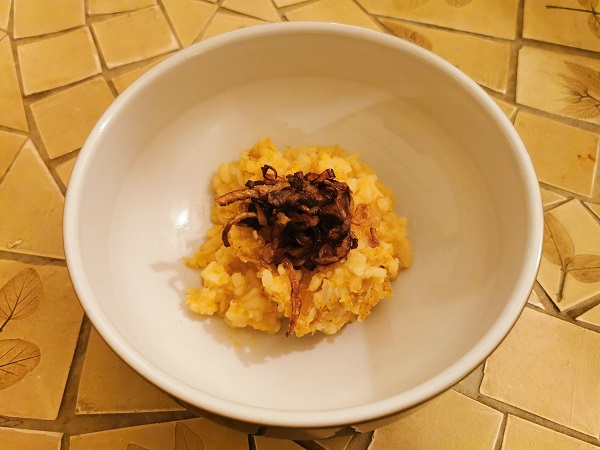I’m taking the Ration Challenge and eating the same rations as a Syrian refugee living in a camp in Jordan for one week. Find out more and sponsor me here! And read previous Ration Challenge posts here.
Day 3 was a sad day. It was the day when I finally squeezed the last of the life out of my first teabag – after leaving it to stew for ages, it was little more than very slightly tea-flavoured coloured water. Nevertheless, I cracked on, draining the remaining chickpeas that I’d soaked overnight, and putting them in a pan of water to cook.
By 9.30am, I’d made a chickpea stew. Well, I say stew: the sauce was simply 10g of my flour ration mixed with salt and paprika, put in a pan with some water and whisked while heating through to thicken. It meant that I had an easy lunch ready for later – all I needed to do was to cook yet more rice.
Lunchtime came around at 11.45am. Cooking up 100g of my rice, I discovered that I needed to add a bit more water to the chickpeas as the sauce had pretty much solidified. It was an incredibly filling meal, but I couldn’t finish it, and actually felt pretty sick afterwards. I think my body is starting to rebel against the lack of fruit and veg – and the lack of overall variety and nutrition.

In the afternoon, I made mujadara – which, for the purposes of the Ration Challenge, is basically rice and lentils cooked with our salt and my single choice of spice that I’m allowed for the whole week. Paprika it was, once again. Normally, a mujadara would be far more exciting: cooked with butter or olive oil rather than vegetable oil, as well as additional spices, fresh parsley, maybe some raisins or slivered almonds… Not this time, sadly. And mine turned out pretty soggy. 85g of red lentils and 150g rice made three portions, which I put in the fridge for later and for the next day – it really didn’t appeal, but I don’t want to waste food.
I couldn’t stomach it at my normal dinner time. But I knew I had to eat something, so after the toddler had gone to bed, I fried up a few spoonfuls in a little oil to give it more texture and flavour, and topped it with 1/7 of my shallot ration, fried until crispy. It was a mission to eat it, even though it was so small: I’m just not hungry at all. On the plus side, though, at least I know I have mujadara in the fridge for if I wake up hungry in the morning…

What strikes me is that these ration packs – the same as are distributed to refugees living in camps in Jordan – are missing vital ingredients needed for a nutritious, balanced diet. Even during World War 2, ration packs contained more variety – and families were able to grow their own fruit and veg, as well as rear their own chickens and other animals for meat and other animal products.
This challenge – as it did last year – makes me realise just how lucky we really are.
Learn more about the Ration Challenge here.
